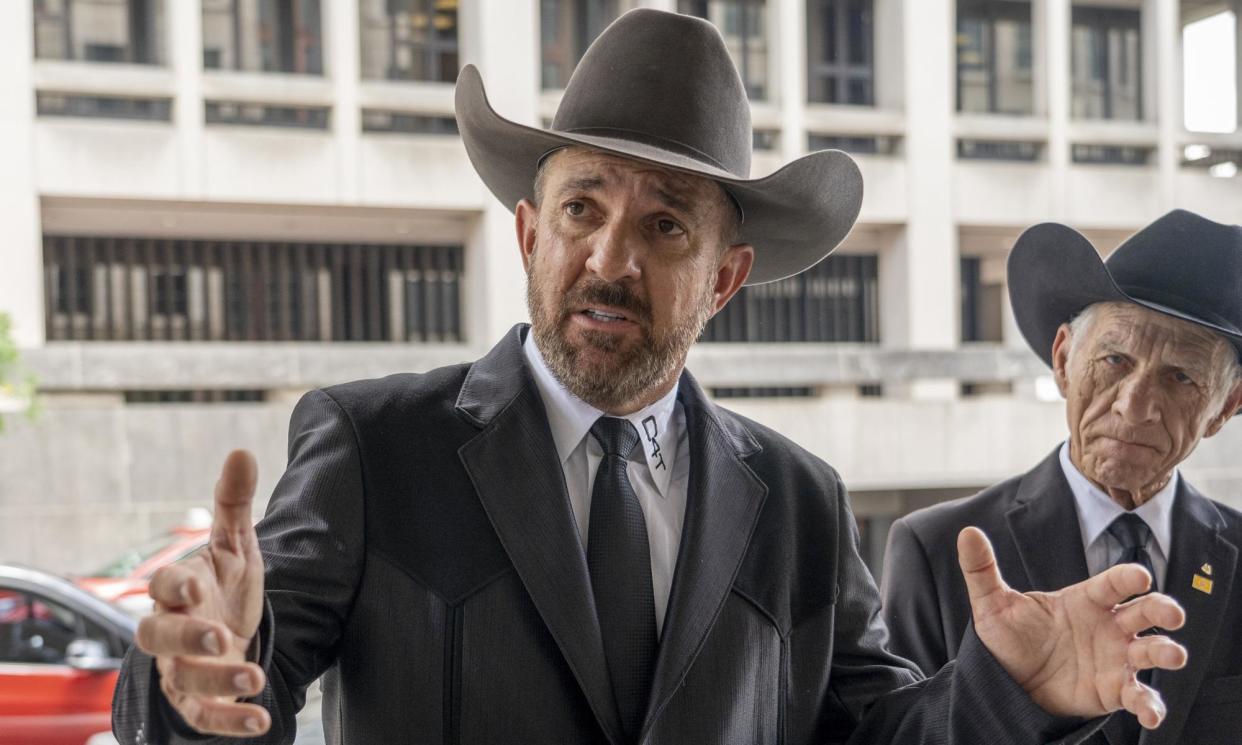Trump is likely to stay on the ballot. One insurrectionist wasn’t so lucky

While the US supreme court appears poised to allow Donald Trump to remain on the ballot this year, a small New Mexico county on the Texas border may stand alone as the only place where the 14th amendment has been used in recent times to remove a government official from the ballot.
Couy Griffin, a county commissioner until 2022 in Otero county, which has a population of around 69,000 people, became the first official in more than a century to be removed from office under a little-used provision in the 14th amendment that bans insurrectionists from holding office. Griffin, the founder of a group called Cowboys for Trump, had been convicted of illegally entering the US Capitol grounds on January 6, a misdemeanor.
Related: US supreme court appears skeptical of Colorado ruling removing Trump from ballot
“I feel like I’ve kind of been the test pilot or the proving ground for anything they’re trying to legally do to Trump, especially in regards to section 3 of the 14th amendment,” Griffin said. He added that he knew the gist of Trump’s case, but had not followed the arguments closely.
“It’s almost like looking at vomit,” said Griffin, who is appealing his own removal to the US supreme court. “You look at it long enough to know what it is and then you quit looking at it because it’s so disgusting. That’s what this Colorado stuff is.”
***
Shortly after the 2020 election, Griffin spoke at a stop-the-steal rally in Albuquerque at an event where the New Mexico civil guard, a militia group, was also present. He said that “normalizing that violence” could be needed to keep Trump in office and participated in a multistate bus tour to recruit people to come to the Capitol on January 6, 2021, Judge Francis Mathew wrote in his decision removing Griffin from the ballot.
Griffin used his position to sow doubt about elections. He encouraged David Clements, a prominent election denier, and his wife, Erin, to question the 2020 election in Otero county, which Trump won overwhelmingly. Griffin shared internal county emails with the Clementses and asked them for guidance on how to respond, Reuters reported. David Clements began urging an investigation and hired a discredited firm to look for fraud.
After the 2022 primary election, the board of commissioners in Otero county refused to certify the election, citing vague concerns about fraud. They were eventually forced to certify after a lawsuit by the Democratic secretary of state, Maggie Toulouse Oliver.
Griffin was removed from office in connection to his insurrection charges several months later.
“I imagine that this is the kind of thing that the framers of section 3 envisioned,” said Donald Sherman, a lawyer at Citizens for Responsibility and Ethics in Washington, which helped bring both the lawsuit against Griffin and the case challenging Trump’s eligibility in Colorado. “Couy Griffin was undermining democracy from his post even after January 6.”
Griffin has not shied away from spectacle. He has had those who disagreed with him removed from county commission meetings and showed up at a county commission meeting after he had been removed to argue with his replacement. He has ridden a horse outside the county administration building in protest of his removal. He also said he planned to ride a horse to arrive at his trial at the federal courthouse in Washington DC, but abandoned this idea.
He noted that after January 6, there had been a recall effort against him that had failed. The subsequent effort to remove him from office succeeded.
“Since I couldn’t be removed legally, constitutionally, through a recall, my adversaries used the fraud and the corruption of the state district court to remove me,” he said.
***
During more than two hours of oral argument earlier this month, the US supreme court appeared concerned that Colorado could unilaterally remove Trump from the ballot and seemed poised to allow him to run. Trump has warned of “chaos and bedlam” if he is removed.
In Otero county, some say Griffin’s removal has actually restored a sense of normalcy to the county commission.
“I think he’s more out of sight, out of mind. When he was here, we had several issues going on, because he was raising the issues. And it seems that after he was removed that a lot of those problems went away,” said Robyn Holmes, the county clerk.
Griffin has an appeal pending at the US supreme court and is hoping that a ruling restoring Trump to the ballot could also benefit him. But there are key differences between the two cases.
When he was removed, Griffin was a county commissioner, a local office, while Trump is a candidate for federal office. New Mexico law includes a so-called “quo warranto” statute that lets private citizens challenge his authority to hold office. In Trump’s case, the justices expressed concern that there was no explicit congressional statute explaining how to enforce section 3 for a national candidate. Some wondered whether section 3 of the 14th amendment could apply to Trump because he was a candidate for office, not an officeholder.
Sherman said the case to remove Griffin was “not a test case”.
“It was a first case to bring against an insurrectionist holding government office that we believe violated his oath and was subject to section 3,” he said. “Insofar as we were demonstrating proof of concept, it was important to bring the strongest case we could find as quickly as possible. But we identified Couy Griffin on his own merits, based on his own conducts. And we thought the case was strong.”
Even after his removal, Griffin said he would continue to try to get Otero county to block election certifications. “Be prepared for that,” he said.


